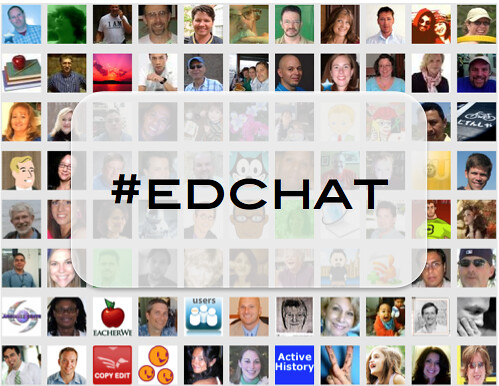Daily I engage in thought provoking discussions on Twitter! I have had anywhere from 2 to 6 Twitter participants engaging in these conversations adding observations, advice, debates, anecdotes, and links. However, Tom Whitby brought to my attention that new people to Twitter and others may not be able to follow the discussions. Therefore, we created the hashtag #edchat for all educators to post their thought-provoking conversations throughout the day. Knowing about the great work Steven Anderson (@web20classroom) does online and offline, we had him join the team!

General Information
- Who can participate? Anyone who has an education related topic they want to explore.
- When can you participate? Unlike some educational meetings this hashtag does not have a set meeting time. If you find yourself in a Twitter discussion with another person just add the hashtag #edchat to the end of your tweets. This way when others join they know what points have already been made.
- What should you contribute? You can contribute thoughts, links, questions, ideas, anecdotes, and arguments.
- What should you avoid? Please do not add a link to your own website if this does not relate to the topic. If your website is related, then feel free to do so. Please, do not leave spam.
How Do I Keep Up with #edchat
You can easily keep updated with #edchat topics by doing any of the following:
- Setting up a column in your Twitter browser for the search #edchat.
- Subscribing to the feed through your RSS reader by clicking here.
- Clicking on this link to view the updates on a website.
- Clicking on the hashtag of any tweet that has “#edchat.”
You choose which way this works for you!
Ways to Use #edchat
The #edchat hashtag is useful in several ways. Here are a few suggestions:
- Develop your Personal Learning Network (PLN) by engaging in conversations with other educators.
- Gather research for an article, blog, or presentation.
- Collaborate with others in solving an issue at your school.
- Exchange ideas to improve an upcoming lesson plan.
- Receive constructive criticism on a lesson plan, presentation, or idea.
- Share tips and advice for educational endeavors, such as holding a parent education workshop.
- Show new teachers to Twitter how useful Twitter is for having thought-provoking conversations.
- Scan the discussion topics to decide which topics educators are interested in for your blog.
- Poll educators to gather research for your blog post or articles.
Challenge:
Join us in an #edchat discussion today!






